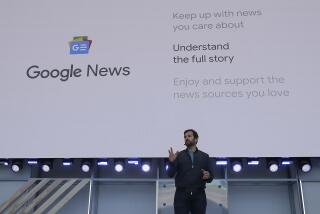Congress in middle of Hollywood copyright clash with Silicon Valley
WASHINGTON — The fight began as a lawsuit between two bloggers over a rude hand gesture, but when lawyers representing two of California’s signature industries showed up in federal court in Boston, it became part of a growing battle between Hollywood and Silicon Valley over the rules governing how and where creative works can be used.
For decades, Hollywood practically owned the laws that protect copyrights and other forms of intellectual property. The studios and their allies in the music industry dominated congressional debates whenever the laws came up for an overhaul.
Now, however, Congress has begun an update of the nation’s copyright law — most of which predates not just the Internet, but even widespread use of computers. And as the legislation proceeds along a lengthy path, the Hollywood lobby is struggling not to get outmaneuvered by an emboldened and increasingly sophisticated coalition of Silicon Valley technology firms, digital rights groups and free marketeers.
Intellectual property rules until recently rarely attracted much public attention. But they have long been crucial to the film industry’s profitable business model. Protecting them is a priority, which is why lawyers for some of the industry’s biggest players rushed to the courthouse in Boston to intervene in an otherwise obscure suit.
The case had started after Gina Crosley-Corcoran, a blogger with strong feelings about giving birth at home, posted a picture of herself directing an obscene gesture at Amy Tuteur, another blogger who writes about obstetrics and parenting.
When Tuteur posted the picture on her blog, Crosley-Corcoran sent her Internet provider what is known as a takedown notice, threatening legal action if the image was not immediately removed. Tuteur sued Crosley-Corcoran, claiming she was wrongly trying to use the copyright law to stifle free expression.
The studios feared that if Tuteur won, the case could damage a legal tool, the takedown demand, which they use extensively.
Their intervention to protect the law was routine. What was unusual was what happened next: The studio lawyers found attorneys for the Electronic Frontier Foundation at court to fight them.
That confrontation, in which Hollywood so far has prevailed, is part of a larger shift.
Two years ago, tech firms and digital rights groups mobilized millions of voters to derail major antipiracy laws championed by the studios. On Jan. 18, 2012, Wikipedia’s millions of users found the site blacked out — save for a warning that antipiracy legislation Hollywood was pursuing would make it impossible for them to use the Internet the way they wanted. Thousands of other sites, including Google, mounted protests in tandem. Congress was deluged with letters and petitions against the Stop Online Piracy Act.
Since then, “everything has changed,” said Pamela Samuelson, director of the Center for Law and Technology at UC Berkeley. “This has become something a lot of people feel strongly about.”
Now, Hollywood is increasingly finding itself playing defense.
In November, for example, amid charges by Sen. Ron Wyden (D-Ore.) that the Motion Picture Assn. of America knew more than he did about the U.S. position in negotiations over a major Pacific trade treaty, WikiLeaks went to work getting and publishing a draft. More protest followed.
“This is the kind of thing that would have gotten pushed through without much public comment 10 years ago,” said Corynne McSherry, intellectual property director at the Electronic Frontier Foundation. “That is not happening now.”
Film industry officials and their backers in Congress say Hollywood is getting miscast as a villain in its bid to do something most Americans support: stop the online theft of films.
As copyright overhaul hearings got underway last year, Rep. Melvin Watt (D-N.C.) lamented “the shift in public discourse about copyright away from the people who actually devote their talent to create works for the benefit of society.”
“Free speech does not mean free stuff,” he cautioned.
Michael O’Leary, executive vice president of global policy for the MPAA, denounces as “ludicrous” the idea “that our industry has adopted a policy that we are somehow restricting free speech.”
“With the possible exception of the news media, there is not an industry out there that is more reliant on free speech than we are,” he said.
The griping that Hollywood has special access in Washington is ironic, he said, coming from a tech coalition backed by “large corporations frequently on the cover of the paper having breakfast with the president.”
But Hollywood is not just tangling with the likes of Google. It is also bumping against savvy activists like Derek Khanna. As a staffer at the House Republican Study Committee, Khanna wrote a scathing report in 2012 declaring that copyright policies cherished by Hollywood amounted to corporate welfare. Some lawmakers squawked. The committee jettisoned the report and let Khanna go.
But Khanna, now a visiting fellow at Yale Law School, had awakened interest among influential conservative think tanks and commentators, who have begun pressuring Republican lawmakers to reconsider a longtime alliance with moviemakers.
While the tech activists have sought to change the way the public engages with Washington, they have also stolen a few pages out of the Hollywood lobbying script. Google and other firms are spending lavishly on lobbyists, and also kicking funds toward advocacy groups with clout.
As the Stop Online Piracy Act debate raged, one of Hollywood’s staunchest allies was the influential conservative group Americans for Tax Reform, famous for pressuring candidates to sign pledges vowing never to vote for tax hikes. Recent disclosure forms revealed the organization had received a $100,000 contribution from the MPAA around the time it was crusading for the piracy law.
After the piracy proposal was defeated and a new one emerged, the organization had become less enthusiastic. Around that time, records show, Americans for Tax Reform got a new donor: Google.
More to Read
Sign up for Essential California
The most important California stories and recommendations in your inbox every morning.
You may occasionally receive promotional content from the Los Angeles Times.











